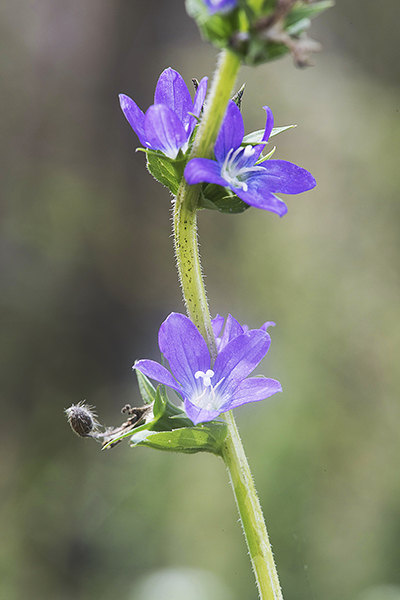Wednesday's Wildflower: Venus Looking-Glass
Triodanis perfoliata
Bellflower Family
(Campanulaceae)
Photo and text submitted by Roger L. Hammer, Dade Chapter
Venus’ looking-glass
is a native herbaceous annual with hairy, ribbed stems and ovate to elliptic,
alternate, clasping leaves that reach about ⅜"–¾" long. The axillary,
sessile, 5-lobed flowers measure about ⅜" across.
Look for this species
from February into May, mostly along roadsides and other disturbed sites
through the Florida panhandle, across the northern peninsula, and south in the
peninsula to Pinellas, Hillsborough, Hardee, Polk, Osceola, and Volusia
counties. Globally it ranges from Argentina northward throughout the United
States into British Columbia, Ontario, and Quebec.
Native Americans made
a tea of the roots and leaves to help relieve indigestion and also “to make one
sick all day” as a treatment for overeating. The leaves were also smoked during
ceremonies.
Triodanis means “three-toothed” and possibly relates to
the 3 calyx lobes on some flowers or the pores on the capsules. The name perfoliata refers
to the stems that seemingly perforate the leaves. Belgium-born botanist and
reverend Julius Arthur Nieuwland (1878–1936) placed it in the genus Triodanis in
1914. The common name alludes to the shiny seeds that resemble a looking glass,
or tiny mirrors. Bees and small butterflies visit the flowers while buntings,
goldfinches, and sparrows eat the seeds. One other species in Florida, Triodanis
biflora, ranges discontinuously across the panhandle south in the
peninsula as far as Highlands County
Roger is a member of
the FNPS Dade Chapter and is currently working on a new Falcon Guide
titled Complete Guide to Florida Wildflowers, due to be
released in Spring 2018. His other wildflower guides include FloridaKeys Wildflowers (2004), Everglades Wildflowers (2nd edition,2014), and Central Florida Wildflowers (2016).
Other Links:
USF Plant Atlas: Triodanis perfoliata
USF Plant Atlas: Triodanis perfoliata




Comments